
- AP Calculus
- AP Chemistry
- AP U.S. History
- AP World History
- Free AP Practice Questions
- AP Exam Prep
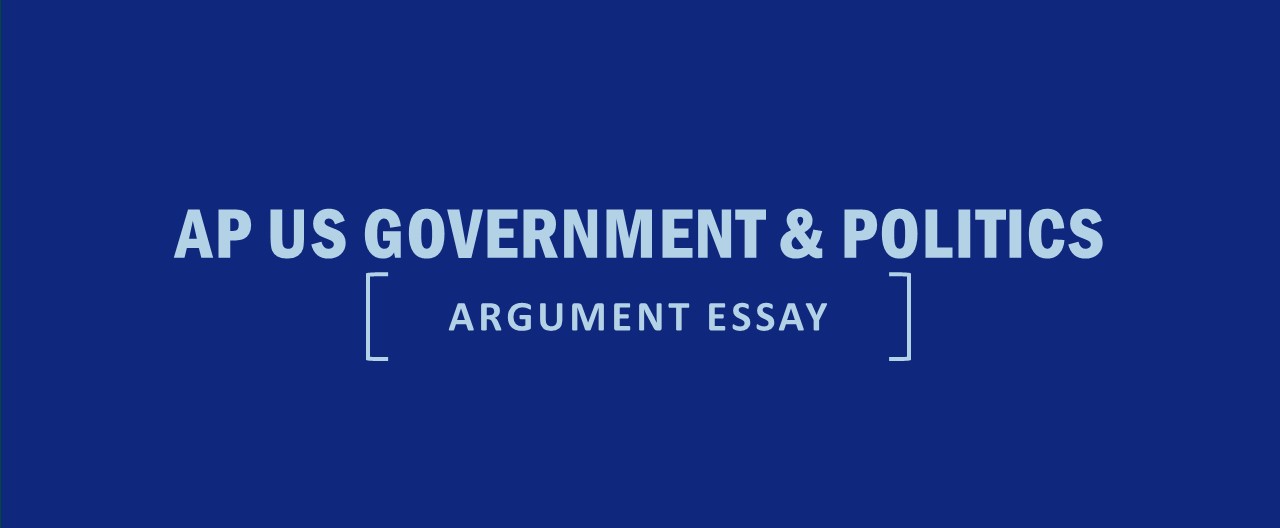

AP U.S. Government and Politics: Argument Essay
Question 4 of the AP U.S. Government and Politics free response section will always be the Argument Essay. These questions begin with a brief paragraph about a given topic, such as the balance between federal and state powers. The prompt will then give specific instructions about how you must format your essay, including a list of several required foundational documents that are relevant to the topic at hand. You will need to discuss one of the listed documents as well as another piece of specific evidence from your own knowledge.
Argument Essay Strategies
While the scoring for the first three free-response questions is more straightforward—you earn points (or not) based on fully addressing each part of the prompt—the scoring for the Argument Essay is a little more complex. The following rubric outlines what the AP readers are generally looking for when they grade your Argument Essay; note the various categories and the ways you can earn points.
Sample Question
- Formulate a defensible thesis that establishes a chain of reasoning.
- Federalist 10
- U.S. Constitution
- Take your other piece of evidence from a different foundational document from the list above OR from your own study.
- Logically explain why your evidence supports your thesis.
- Present and reply to an alternative viewpoint using refutation, concession, or rebuttal.
Step 1: Analyze the Prompt
Step 2: plan your response.
You’ll want to create a brief outline before you start writing, just like you would for any other full-length essay. As you saw from the rubric, AP readers are interested in your thesis development, your use of evidence, and your treatment of an alternative view. Everything you write should be toward one or more of those ends.
You will need to state a thesis that specifically addresses the prompt and makes a claim. Avoid rewording the prompt or being too general. A good question to ask yourself is, “Am I actually taking a position on this issue that someone else might argue against?” Also, while the Argument Essay necessitates a longer, more detailed response than the other free-response question types, it does not require a formal introduction; in fact, writing a lengthy introduction can take up valuable time and frustrate the AP reader who is scoring your essay. Assert your thesis as soon as possible, and then move into the rest of your response.
It is important to note that the Argument Essay’s topic and prompt wording will always intentionally allow for multiple positions. Therefore, you should be strategic and choose the position that you can best back up with evidence. You may even advocate for a different position than the one you personally agree with! To that end, no matter how strongly you feel about a topic, always present your evidence and claims in a balanced manner. Throughout your essay, even and especially when responding to an alternative viewpoint, avoid wording that makes it seem like your argument is simply your personal opinion (e.g., “I think” or “I believe,” or any language that is overly emotional).
With all of this in mind, a high-scoring writer might write the following outline:
Thesis: Trustee is the best model (ideals of Constitution)
- Madison’s fear: large country + big gov’t = factions (many groups disagree)
- Trustee can mediate, come to concl, act in best interests
- Needed trustee model to make change
- Civil rights and women’s rights movements
- The Civil Rights Act of 1964 and Voting Rights Act of 1965
Response to alternative view: Anti-Feds would fear large repub (Brutus), but pol system in place would keep trustee honest
Step 3: Action! Write Response & Step 4: Proofread
Sample high-scoring response.
The trustee model of legislative representation is the best reflection of the founders’ intentions in setting up American democracy because it offers the best hope for what the Preamble to the Constitution calls “a more perfect union,” one that will bring together war- ring factions and increase harmony.
As James Madison pointed out in Federalist 10, it is inevitable that a republic will contain many groups which vehemently disagree. The bigger a country grows, the more frequent and violent factional clashes are likely to become. Madison was looking ahead to the U.S. that would burst the bounds of the original colonies and create more factionalism. This vision of an expanding, clashing nation makes the trustee model very appealing. A trustee Congressperson is one who will listen to all sides, make an independent judgment, but then go on to explain it so that opponents may be persuaded to change their minds, thus bringing resolution to conflicts.
A trustee is a representative willing to do the principled thing even if the public thinks otherwise. Many issues in our history have seemed so polarized that they were beyond resolution and could not wait for popular consensus. This was the case with civil rights issues and legislation in the 1960s. Technically, African Americans had the right to vote since the passage of the Fifteenth Amendment in 1870. However, this right was violently suppressed through intimidation tactics and a variety of restrictive measures such as poll taxes and literacy tests. It was not until the passage of the Voting Rights Act of 1965 that substantial voting protections were extended to all black people. The Voting Rights Act outlawed literacy tests and other tactics; under this act, federal officials were sent to the South to ensure that African Americans were allowed to vote free from fear and intimidation, and the election practices of local governments were held under greater scrutiny. Civil rights movement leaders had challenged discriminatory practices for decades, but due to intense polarization in society, there was no public consensus on how to address racism in voting practices or even agreement as to whether to address it at all. Legislators had to go against the opinions of the majority in order to act in a way that advanced American ideals for all citizens, and the public eventually caught up.
Similarly, legislators pushed through the Civil Rights Act of 1964 which was supported by people within social movements but not by the general populace. Additionally, the Civil Rights Act of 1964 touched on the goals of not just the civil rights movement but also the women’s rights movement; for example, Title VII of the Civil Rights Act prohibited sex discrimination in public accommodations. Members of these movements had been working for years to get society at large to expand rights and protections to all people. However, if legislators had waited to act until a majority of their constituency approved of these civil rights bills, the bills may never have passed. In this way, the trustee model can be used to uphold the rights of the minority despite majority resistance.
The trustee idea would have been opposed by Brutus and other Anti-Federalists. Brutus 1 warns that a large republic would necessarily be disconnected from its people. Following this logic, a concern with the trustee model would be that the representative would deviate too far from the will of the people and become despotic. But it is important to note that the people have the ultimate voice if they disagree with the trustee’s judgments: the power of the ballot. The legislator’s desire to stay in power is a strong check on him or her, acting as an incentive to listen to constituents.
All in all, the trustee is in the best position to reduce the intense factionalism Madison feared. Even before the advance of mass media, the trustee had many means to learn of the people’s different views and to explain why the legislator was voting a certain way, or advancing this or that philosophy. This give and take of ideas surely helped to get the republic through its rocky early decades, and also helped the country to recover from the volatile growing pains and changes in the mid-twentieth century by finding ways to bring people together and advance equal rights for all.
Sample Response Explanation and Scoring
- Thesis (0–1 pt): The writer sets up a clear X because Y sentence to introduce the thesis, which could be paraphrased as, The trustee model brings about harmony. Everything that follows is connected to the founders’ ideal of harmony. The writer would therefore earn 1 point for Thesis.
- Support (0–3 pts): There is more than enough evidence to gain the full 3 points for Support, as the writer explains Madison’s argument in Federalist 10 and elaborates upon relevant historical examples of disharmony that those acting as trustees helped to fix through assertive actions. In addition, the references to the Constitution and Brutus 1 (while unnecessary for earning full credit in Support) show a strong command of course material.
- Reasoning (0–1 pt): The writer earns the 1 point for Reasoning by clearly explaining how a trustee offers the best hope for Madison’s vision. Specifically, the writer asserts in paragraphs 3 and 4 how trustees could not wait for public opinion in order to act.
- Reply to Alternative Viewpoint (0–1 pt): There is a whole paragraph at the end dedicated to rebutting the Anti-Federalists’ objections. In this way, the writer makes it clear that this requirement has been met and earns the final 1 point.
Question-Specific Rubric: 6 points (1 + 3 + 1 + 1)
Learn more about the other free response questions on the AP U.S. Government and Politics exam. Concept Application • Quantitative Analysis • SCOTUS Comparison
You might also like
Call 1-800-KAP-TEST or email [email protected]
Prep for an Exam
MCAT Test Prep
LSAT Test Prep
GRE Test Prep
GMAT Test Prep
SAT Test Prep
ACT Test Prep
DAT Test Prep
NCLEX Test Prep
USMLE Test Prep
Courses by Location
NCLEX Locations
GRE Locations
SAT Locations
LSAT Locations
MCAT Locations
GMAT Locations
Useful Links
Kaplan Test Prep Contact Us Partner Solutions Work for Kaplan Terms and Conditions Privacy Policy CA Privacy Policy Trademark Directory

- Teacher Opportunities
- AP U.S. Government Key Terms
- Bureaucracy & Regulation
- Campaigns & Elections
- Civil Rights & Civil Liberties
- Comparative Government
- Constitutional Foundation
- Criminal Law & Justice
- Economics & Financial Literacy
- English & Literature
- Environmental Policy & Land Use
- Executive Branch
- Federalism and State Issues
- Foreign Policy
- Gun Rights & Firearm Legislation
- Immigration
- Interest Groups & Lobbying
- Judicial Branch
- Legislative Branch
- Political Parties
- Science & Technology
- Social Services
- State History
- Supreme Court Cases
- U.S. History
- World History
Log-in to bookmark & organize content - it's free!
- Bell Ringers
- Lesson Plans
- Featured Resources

Lesson Plan: AP Government: Argumentative Essay Practice
The Federalist Papers
Boston College professor Mary Sarah Bilder gives a brief overview backgrounding the Federalist Papers
Description
This is intended as an end-of-course review activity for practice with the argumentative essay format included on the AP United States Government and Politics exam since the 2018 redesign. Eleven practice prompts are provided, reflecting content from Units 1-3.
ARGUMENTATIVE ESSAY PROMPT ANALYSIS
- Review the provided Argumentative Essay Prompts in either an individual or jigsaw format.
- Write a thesis statement for your selected prompt(s) and identify the selection you would make from the provided list and the second piece of evidence you would choose.
- If there are prompts for which you struggle to develop a thesis, or items on the bulleted lists with which you are not conversant, use the hyperlinked C-SPAN Classroom resources to extend your understanding of the required founding documents and SCOTUS cases that you found challenging.
ARGUMENTATIVE ESSAY
- Chose one or more of the provided Argumentative Essay Prompts , as assigned, and use the planning and exploration you did above to write a full essay in response to your designated prompt(s) in 25 or fewer minutes , since that's the time limit you'll face on the AP Exam!
- Exchange essays with a classmate and evaluate each others' work.
- 1st Amendment
- Branches Of Government
- Constitution
- House Of Representatives
- Separation Of Powers
- Supreme Court
AP U.S. Government and Politics Exam Tips
The following strategies for answering the free-response questions will help you on exam day.
- Answering essay questions generally requires a good deal of training and practice. Students too often begin to write immediately, which can create a string of disconnected, poorly planned thoughts. You should approach questions methodically and plan your answers before putting pencil to paper.
- Carefully analyze the question, thinking through what is being asked, and identify the elements that must be addressed in the response. Each AP Exam asks different types of questions about each subject. For example, some questions may require you to consider the similarities between people or events, and then to think of the ways they are different. Others may ask you to develop an argument with examples in support of or opposing a particular movement or policy. Be sure to carefully craft your answer in response to what is actually being asked in the question prompt.
- After you have determined what is involved in answering the question, consider what evidence you can incorporate into your response. Review the evidence you learned during the year that relates to the question and then decide how it fits into the analysis. Does it demonstrate a similarity or a difference? Does it argue for or against a generalization that is being addressed?
- Whenever you offer evidence to illustrate contrast or similarity, clearly state your intent. Then, with additional information or analysis, elaborate on the ways in which these pieces of evidence are similar or different. If there is evidence that refutes a statement, explain why it argues against the statement. Your answer should reflect an understanding of the subtleties of the questions.
- Begin writing only after you have thought through the evidence you plan to use and have determined what your thesis statement will be. Once you have done this, you will be in a position to answer the question analytically instead of in a rambling narrative.
- Learn how to present your thesis statement: make your overarching statement or argument and then position your supporting evidence so that it is obviously directed to answering the question, as opposed to being a string of abstract generalizations. State your points as clearly as possible and explicitly connect them to the larger thesis. Do not leave it to the reader to infer what is meant or how something illustrates a point.
- If you have done the analytical work required prior to writing, you should be able to demonstrate an understanding of the complexity of the question. You should state your thesis, introduce the elements that support the thesis, and demonstrate the logic that led you to link the elements in support of the thesis. By applying these ideas you will construct an excellent essay.
- While essay writing in general is a valuable exercise, you may wish to work specifically on free-response questions from previous AP Exams. This will allow you to compare your own responses with those that have already been scored and evaluated. Free-response questions are available through the AP Program in numerous formats. Fnd sample essays for U.S. Government and Politics on the Past Exam Questions page at AP Central.
Pay close attention to the task verbs in the question. Each one directs you to complete a specific type of response. Here are the task verbs you’ll see on the exam:
- Compare : Provide a description or explanation of similarities and/or differences.
- Define : Provide a specific meaning for a word or concept.
- Describe : Provide the relevant characteristics of a specified topic.
- Develop an argument : Articulate a claim and support it with evidence.
- Draw a conclusion : Use available information to formulate an accurate statement that demonstrates understanding based on evidence.
- Explain : Provide information about how or why a relationship, process, pattern, position, situation, or outcome occurs, using evidence and/or reasoning. Explain “how” typically requires analyzing the relationship, process, pattern, position, situation, or outcome; whereas explain “why” typically requires analysis of motivations or reasons for the relationship, process, pattern, position, situation, or outcome.
- Identify : Indicate or provide information about a specified topic, without elaboration or explanation.

Sample Prompts for the Argument Essay FRQ- AP government
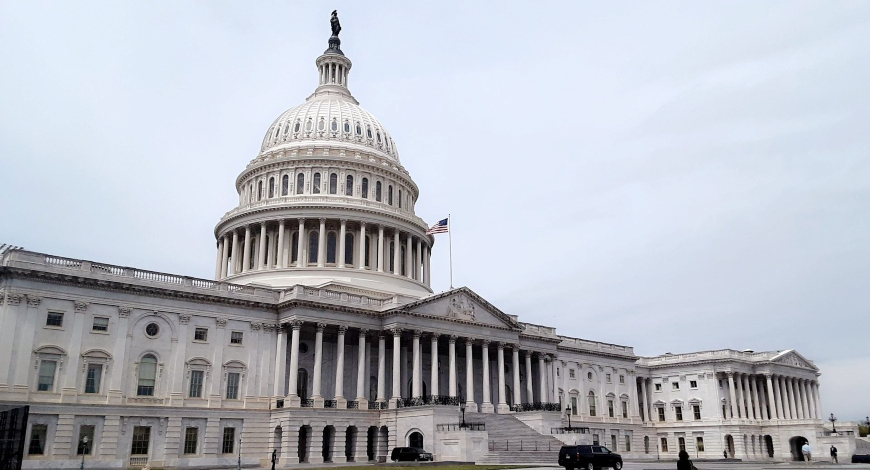
Below are 16 topics, each of which includes:
- A sample essential question which introduces the prompt
- A draft prompt including three founding documents that could help shape the students’ arguments.
Each prompt is crafted to encourage deep analysis and aligns with key AP Government concepts, ensuring your students are well-prepared for exam success.
AP Government Argument Essay Samples
- NEW ! Media censorship: Should the government play an active role in the censorship of social media?
- Independent judiciary: Is an independent judiciary a threat to or a savior for democracy?
- Congressional roles: Does the delegate or trustee model of Congressional representation best serve the needs of the people as the Framers intended?
- Federalism in the Age of Coronavirus: Should the federal government or the states be most responsible for responding to the Coronavirus outbreak?
- Political Parties: Do political parties hinder or promote democracy?
- Congressional oversight : Is congressional oversight healthy or unhealthy for our system of government?
- Interest groups: Do interest groups hinder or promote democracy?
- Civil Rights: Should the federal government have power over states in the shaping of civil rights policies?
- Citizen participation: Does citizen participation really matter?
- Photo IDs and federalism: Do states have the authority to pass photo identification laws which restrict people’s ability to vote?
- Presidential power: Do executive orders give the president too much power?
- Gridlock: Is gridlock healthy or unhealthy for our system of government?
- Term limits: Do congressional term limits violate or honor popular sovereignty?
- Primaries and caucuses: Is the presidential nominating process democratic?
- Social Media : Is social media a healthy way for citizens to participate in our political system?
- Electoral College: Should the electoral college be abolished?
- Representative versus direct democracy: Which is a better vehicle to serve citizen needs– a representative or direct democracy?
Enhance Your Classroom Experience! You understand the challenges of keeping students engaged and preparing them for the AP exam. Our carefully curated essay prompts are designed to align with AP standards, fostering critical thinking and discussion in your classroom. Get ready to inspire your students with materials that cater to the dynamic world of government and politics.
For more resources for AP government, visit HERE
Other posts you might like…, you may also like.

The Secret to Mastering Critical Thinking in an AI Era

If You’re Trying to Figure Out When Robots Will Replace Teachers, You Came to the Right Place

AI in Education: A Game Changer or a Double-Edged Sword?

The Human Element in AI-Driven Classrooms
Copyright © 2023 Teach Different. All rights reserved.
Connect with:
Login with your site account

Remember Me
Not a member yet? Register now
Register a new account
I accept the Terms of Service
Are you a member? Login now
Don't miss out on the conversation! Subscribe to our blog
Email Address
Subscribe Now
How To Answer the AP® United States Government And Politics Free Response Questions (FRQs)
The AP® U.S. Government and Politics exam consists of two sections: Section I: multiple-choice questions (MCQs), and Section II: free-response questions (FRQs). In this guide, we will look at the FRQ section of the exam.
We will start by examining the format of the writing section of the AP U.S. Gov exam, giving you tips to score well on the FRQs. In the following sections, we have also included a few examples of AP U.S. Gov FRQ writing prompts that have been used on past exams. By the end of this article, you’ll know how to confidently prepare for the FRQ portion of the AP U.S. Gov exam.
Format of the AP U.S. Government FRQ section
Section II consists of four FRQs you need to answer in 100 minutes (1 hour and 40 minutes) and is worth 50% of your overall exam score (1 FRQ is worth 12.5%). Each FRQ in this section tests you on specific practices and skills you’re expected to master by the end of AP U.S. Gov.
Remember to plan your time wisely when practicing for the FRQ section. You’ll need time to read and understand what the question is asking, analyze the information given, then provide your answer with evidence, as-needed. It's important to create a plan for each FRQ that allows for enough time to read the question, plan your response, write it down, and then review it.
The table below describes each type of FRQ and what is required in each response. To make time management easier for you, we’ve also included the approximate time you should allot for planning, writing, and reviewing each FRQ.
| FRQ Type | Description | Recommended time per FRQ |
|---|---|---|
| Concept Application (3 points) | Explain the effects of a political/government institution, behavior, or process. Apply your understanding of course concepts in the context of an authentic scenario. | 15 mins planning and writing 5 mins reviewing/rewriting |
| Quantitative Analysis (4 points) | Describe the relevant data provided to you, along with a conclusion you have drawn from an identifiable pattern or trend in the data. Then apply your interpretation of the data in the context of a political concept. | 15 mins planning and writing 5 mins reviewing/rewriting |
| SCOTUS Comparison (4 points) | Describe and then compare or contrast case facts and holdings of a provided non-required case with those of a specified required case. Apply the non-required case’s holding in the context of a course concept. | 15 mins planning and writing 5 mins reviewing/rewriting |
| Argument Essay (6 points) | Make and defend a claim in response to a prompt, citing evidence from at least one foundational document and your course knowledge. Establish reasoning to support your claim and to refute/rebut an alternate claim. | 30 mins planning and writing 10 mins reviewing/rewriting |
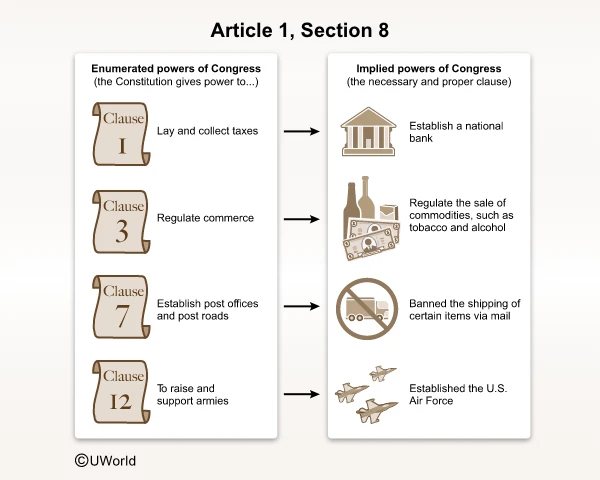
How to Answer AP U.S. Government and Politics Free-Response Questions
Here are some general tips for how to answer AP Gov FRQs:
Start with the prompt that seems easiest
Starting with the easiest question can boost your confidence on the exam. Quantitative Analysis is the easiest for some students because it does not require them to read documents to answer the question. The Concept Application is easier for other students because it is less complex. Many students choose to answer the Argument FRQ last because it is the only one that requires an essay format.
Use evidence from the stimulus to support your interpretation
To score well on the FRQs, ensure you include paraphrased references to evidence from the stimulus materials. Focus on specific words and details that support what you have to say. For the Concept Application and SCOTUS comparison FRQs, refer to details from the provided scenario and Supreme Court case, respectively. For the Quantitative Analysis, identify specific data points and/or trends. Lastly, incorporate specific evidence from a foundational document and your course knowledge for the argument essay. For each FRQ, explain how the evidence supports your response
You do not need to earn every point to score well
Each FRQ is worth multiple points. Simpler tasks, like identifying, earn points, just as more complex tasks, like refuting opposing claims, earn points. Even if you have difficulty completing a FRQ, you can score well by completing as many parts as possible.
Don’t worry too much about making spelling, punctuation, and grammar mistakes
The scorers understand that you are writing under a time limit and that your FRQ is more like a rough draft. If you make a mistake or change your mind, simply draw a line through the mistake and keep going.
AP United States Government and Politics FRQ examples
Here are some examples of AP U.S. Gov FRQs from past exams to give you an idea of the kinds of questions you’ll see on the test. These questions come directly from the College Board Course site, an excellent source of course materials. Each tab explains one type of FRQ with an example and discusses the key points you need to consider while approaching them.
For FRQ 1, you will be given a brief account of a real-life scenario. You will demonstrate your understanding of the scenario by describing some aspects in the context of a course concept. You will then demonstrate a more expansive understanding of the course concept by explaining it further and applying it in a hypothetical situation.
FRQ Example 1
In April of 2018, Mark Zuckerberg, the founder of the social media company Facebook, was called to testify before the Senate Committee on the Judiciary and the Senate Committee on Commerce, Science, and Transportation about, among other things, a data leak that led to 87 million Facebook users’ private information being sold without their consent.
Senators questioned Zuckerberg about whether Facebook could adequately regulate itself and protect personal information or whether Congress should intervene. Zuckerberg defended the company, emphasizing its mission to better connect the world. In response, Zuckerberg stated, “My position is not that there should be no regulation. I think the real question, as the Internet becomes more important in people’s lives, is what is the right regulation, not whether there should be or not.”
After reading the scenario, respond to A, B, and C below.
- A) Referencing the scenario, describe the enumerated power in Article I of the Constitution that gives Congress the authority to regulate a business like the one above.
- B) Explain how the two-chamber structure of the legislature affects the ability of Congress to exercise the power described in Part A.
- C) If Congress decides to regulate how social media companies gather and use the data of their users, explain how these companies could use the political process to ensure that the new regulation does not negatively affect them.
Source : College Board
For FRQ 2, you will be given relatively current data to interpret. You will be asked to draw conclusions based on patterns or trends you identify in the data and then apply your interpretation of the data in the context of a course concept.
FRQ Example 2
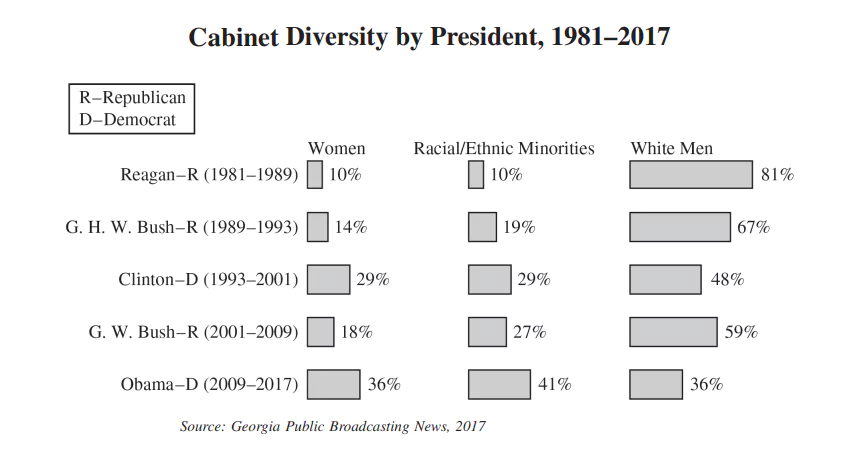
Use the bar graphs to answer the following questions.
- A) Identify the president who had the highest percentage of women and racial/ethnic minorities serving in the Cabinet
- B) Describe a pattern in the percentage of racial and ethnic minorities serving in Cabinet positions.
- C) Draw a conclusion about the political parties and the diversity of Cabinet appointments as shown in the bar graphs.
- D) Explain how interest groups can influence presidential Cabinet appointments as shown in the bar graphs.
For FRQ 3, you will be given a description of a non-required Supreme Court case. The description includes relevant case background information along with some details about the Court’s holding. First, you will identify and describe a course-relevant similarity or difference between the non-required case and a specified required SCOTUS case. Then you will explain the similarity or difference in terms of how it is applied in both cases—this is essentially an exercise in comparing/contrasting. Finally, you will apply a relevant aspect of the non-required case in the context of an essential course concept.
FRQ Example 3
This question requires you to compare a Supreme Court case you studied in class with one you have not studied in class. A summary of the Supreme Court case you did not study in class is presented below and provides all of the information you need to know about this case to answer the prompt.
McCutcheon v. Federal Election Commission (2013)
Alabama businessman Shaun McCutcheon contributed $33,088 to sixteen different candidates running for federal office in 2012. His donations exceeded the aggregate (total) campaign finance limit established by the Bipartisan Campaign Reform Act (BCRA) of 2002. This law limited the total amount of political contributions that an individual could make in a given two-year election period to federal candidates, federal political action committees, and political parties.
In the subsequent case, McCutcheon v. Federal Election Commission (2013), the Court ruled in a 5-4 decision that limits on the amount of political contributions established by the BCRA are unconstitutional. The Court held that contributing money to a candidate is an exercise of an individual’s right to participate in the electoral process…. A restriction on how many candidates and committees an individual may support is hardly a modest restraint on those rights. The government may no more restrict how many candidates or causes a donor may support than it may tell a newspaper how many candidates it may endorse.”
- A) Identify the civil liberty that is common in both Citizens United v. Federal Election Commission (2010) and McCutcheon v. Federal Election Commission (2013).
- B) Explain how the decision in Citizens United v. Federal Election Commission relates to the reasoning in McCutcheon v. Federal Election Commission.
- C) Explain how the decision in McCutcheon v. Federal Election Commission can be used to support the participatory, pluralist, or elite model of democracy.
FRQ 4 is the only FRQ that you must write as an essay, with its successive parts flowing in a logically coherent order. For FRQ 4, you will be given a contextual statement that frames the main issue or topic of your argument, and then you will assert and defend a definitive stance on the topic. Defending your stance requires two pieces of evidence: one must come from a foundational document out of the three options you are given, and the other can come from a different foundational document (even if it’s not one of the listed options) or from a course concept. You must establish a line of reasoning by explaining how your evidence supports your stance, and then you must respond to an opposing or alternate stance you provide.
FRQ Example 4
Environmental regulation is a complex policy area that involves both the states and the federal government. Develop an argument that takes a position on whether the federal government should be primarily responsible for managing environmental policy or if it should be the responsibility of the states.
Use at least one piece of evidence from one of the following foundational documents:
- The Federalist 10
- The Preamble of the United States Constitution
In your response, you should do the following:
- Respond to the prompt with a defensible claim or thesis that establishes a line of reasoning.
- One piece of evidence must come from one of the foundational documents listed above.
- A second piece of evidence can come from any other foundational document not used as your first piece of evidence, or it may be from your knowledge of course concepts.
- Use reasoning to explain why your evidence supports your claim or thesis.
- Respond to an opposing or alternate perspective using refutation, concession, or rebuttal.
How can I practice AP United States Government and Politics free-response questions?
Practicing AP U.S. Gov FRQs is important before the exam, which is usually scheduled on the first day of every AP testing cycle. The more you practice, the more you understand the expectations required to perform well on the FRQs. The College Board site has past-released exams that you can use for AP U.S. Gov FRQ practice with scoring guidelines, student samples, and scoring distributions. Students who understand how to score according to the scoring guidelines tend to perform better on the FRQ portion of the AP exam. To understand how to use the scoring guidelines with your own work, try using them to score a pre-graded student sample, then see if your score matches the one it was actually given. If your score does not match, ask your teacher for support with understanding the scoring guidelines better.
Using an online prep that tests your content knowledge is also a great way to increase your understanding of content and perform better on both sections of the AP Gov exam. UWorld’s AP U.S. Gov question bank can help you learn and review materials effortlessly, so you retain more of what you learn! For each question, there is a mini-lesson that provides content you are expected to understand for the AP exam. Each question has explanations for the correct answer choice, rationales for the wrong answer choice, and a summary of the most important content you need to remember for the exam.
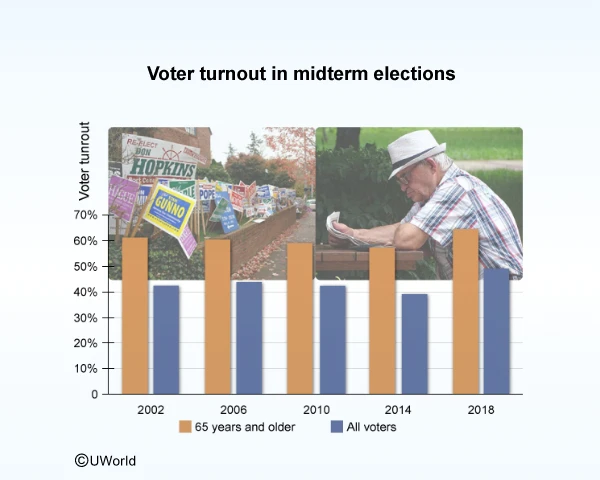
Frequently Asked Questions
How is the ap u.s. gov frq graded.
Section II is graded by high school AP U.S. Gov teachers and college professors who teach intro-level government and politics courses. The College Board provides rubrics that tell scorers what a response must contain in order to earn a point. FRQs are graded on the quality of their ideas and not on the accuracy of grammar, punctuation, or spelling. Handwriting is not factored into the score, and there are specially designated readers available to help read and score essays with challenging handwriting.
How long is the FRQ section on the AP United States Government and Politics exam?
Where can i find released frqs from past ap u.s. gov exams.
You can find released past exam FRQs on the College Board AP website for AP U.S. Gov .
- (2023). AP United States Government and Politics . College Board. Retrieved November 22, 2023, from https://apstudents.collegeboard.org/courses/ap-united-states-government-and-politics
- (2023, Fall). AP United States Government and Politics Course and Exam Description . College Board. Retrieved November 22, 2023, from https://apcentral.collegeboard.org/media/pdf/ap-us-government-and-politics-course-and-exam-description.pdf
Read More About the AP U.S. Government & Politics Exam
We use cookies to learn how you use our website and to ensure that you have the best possible experience. By continuing to use our website, you are accepting the use of cookies. Learn More
Debate Topics
Need to write an argumentative essay? Preparing for an upcoming debate? ProCon.org has over 100 topics complete with pro and con arguments, quotes and statistics from experts, historical information, and other pertinent research.
Abortion – Should abortion be legal?
Alternative Energy – Can alternative energy effectively replace fossil fuels?
American Socialism – Should the U.S. become socialist?
Animal Dissection – Should K-12 students dissect animals in science classrooms?
Animal Testing – Should animals be used for scientific or commercial testing?
Artificial Intelligence – Is artificial intelligence good for society?
Banned Books – Should parents or other adults be able to ban books from schools and libraries?
Binge-Watching – Is binge-watching good for you?
Cancel Culture – Is cancel culture (or callout culture) good for society?
CBD for Pets – Is CBD good for pets?
Cell Phone Radiation – Is cell phone radiation safe?
Cheerleading – Is cheerleading a sport?
Churches & Taxes – Should churches (including mosques, synagogues, etc.) remain tax-exempt?
College Education – Is a college education worth it?
Congressional Term Limits – Should term limits be imposed on U.S. Senators and Representatives?
Constitutional Carry of Handguns – Should permitless, “constitutional carry” of guns be legal?
Corporal Punishment – Should corporal punishment be used in K-12 schools?
Corporate Tax Rate – Should the federal corporate income tax rate be raised?
Cuba Embargo – Should the United States maintain its embargo against Cuba?
DACA & Dreamers – Are DACA (Deferred Action for Childhood Arrivals) and the DREAM Act good for America?
Daylight Saving Time – Should the United States keep daylight saving time?
DC AND Puerto Rico Statehood – Should Washington, DC, and Puerto Rico be granted U.S. statehood?
Death Penalty – Should the death penalty be legal?
Defund the Police – Should police departments be defunded, if not abolished?
Dress Codes – Should dress codes be implemented and enforced?
Drinking Age – Should the drinking age be lowered from 21 to a younger age?
Drone Strikes – Should the United States continue its use of drone strikes abroad?
Drug Use in Sports – Should performance-enhancing drugs be accepted in sports?
Election Day National Holiday – Should the election day be made a national holiday?
Electoral College – Should the United States use the electoral college in presidential elections?
Employer Vaccine Mandates – Should employers be able to mandate vaccinations?
Felon Voting – Should people who have completed felony sentences be allowed to vote?
Fighting in Hockey – Should fighting be allowed in hockey?
Filibuster – Should the U.S. Senate keep the filibuster?
Fracking – Should the United States continue fracking
Free College – Should public college be tuition-free?
Fur Clothing Bans – Should fur clothing be banned?
GMOS – Should genetically modified organisms (GMOs) be grown?
Gold Standard – Should the United States return to a gold standard?
Golf – Is golf a sport and are golfers athletes?
Gun Control – Should more gun control laws be enacted?
Historic Statue Removal – Should historic statues be taken down?
Homework – Is homework beneficial?
Illegal Immigration – Should the U.S. government provide a path to citizenship for undocumented immigrants?
Internet – Is the internet “making us stupid?”
Kneeling during the National Anthem – Is kneeling during the national anthem an appropriate form of protest?
Mandatory National Service – Should the United States have mandatory national service?
Medical Aid in Dying (MAID) – Should medical aid in dying be legal?
Medical Marijuana – Should medical marijuana be legal?
Milk – Should humans consume dairy milk?
Minimum Wage – Should the federal minimum wage be increased?
Net Neutrality – Should the U.S. have net neutrality laws?
Obesity – Is obesity a disease?
Olympics – Are the Olympic games an overall benefit for their host countries and cities?
OTC Birth Control Pills – Should birth control pills be available over-the-counter (OTC)?
Penny – Should the penny stay in circulation?
Pit Bull Bans – Should breed-specific legislation (“pit bull bans”) be enacted?
Pokémon – Is Pokémon Go good for our society?
Police Body Cameras – Should police officers wear body cameras?
Prescription Drug Costs – Should the U.S. federal government regulate prescription drug prices?
Presidential Election, 2024 – 2024 Presidential Election Site
Private Prisons – Should prisons be privatized?
Recreational Marijuana – Should recreational marijuana be legal?
Reparations for Slavery – Should the federal government pay reparations to the descendants of slaves?
Right to Healthcare – Should all Americans have the right (be entitled) to health care?
Sanctuary Cities – Should sanctuary cities receive federal funding?
Santa Claus – Is there really a Santa Claus?
Saturday Halloween – Should Halloween be moved permanently to Saturday?
School Uniforms – Should students have to wear school uniforms?
Single-use Plastics Ban – Should single-use plastics be banned?
Social Media & Digital Addiction – Does social media spur digital addiction and other social ills?
Social Security Privatization – Should social security be privatized?
Space Colonization – Should humans colonize space?
Standardized Tests – Do standardized tests improve education in America?
Student Loan Debt – Should student loan debt be eliminated via forgiveness or bankruptcy?
TikTok Bans – Should TikTok be banned?
Uber & Lyft – Are ride-sharing companies a benefit to society?
Universal Basic Income (UBI) – Should the United States implement a universal basic income?
U.S. Supreme Court Packing – Should packing the U.S. Supreme Court ever be considered?
Vaccines for Kids – Should states be allowed to mandate vaccines for school attendance??
Vaping E-Cigarettes – Is vaping e-cigarettes safe?
Vegetarianism – Should people become vegetarian?
Video Games & Violence – Do violent video games contribute to youth violence?
Voting Age – Should the voting age be lowered to 16?
Voting Machines – Are electronic voting machines the best method for voting?
Zoos – Should zoos exist?
Archived Topics
Please note that ProCon no longer updates these debates.
ACLU – Is the ACLU good for America?
Big Three Bailout – Should the big three car manufacturers be bailed out by the U.S. government?
Born Gay – Is sexual orientation determined at birth?
Climate Change – Is human activity primarily responsible for global climate change?
College Football Playoffs – Should college football replace the Bowl Championship Series (BCS) with a playoff system?
Dakota Access Pipeline – Should the Dakota Access Pipeline be completed?
D.A.R.E. – Is the D.A.R.E. program good for America’s kids (K-12)?
Gay Marriage – Should gay marriage be legal?
Congressional Insider Trading – Should insider trading by Congress be allowed?
Israeli-Palestinian Conflict – What are the solutions to the Israeli-Palestinian conflict?
Obamacare – Is the Patient Protection and Affordable Care Act (Obamacare) good for America?
Paying College Athletes – Should colleges and universities pay college athletes?
President Bill Clinton – Was Bill Clinton a good president?
President Ronald Reagan – Was Ronald Reagan a good president?
Presidential Election, 2008 – Which candidate would make the best U.S. president?
Presidential Election, 2012 – Which candidate should be U.S. president in 2012?
Presidential Election, 2016 – The candidates and where they stand on the issues
Presidential Election, 2020 – 2020 Presidential Election Site
Prostitution – Should prostitution be legal?
School Vouchers – Should states have school voucher programs?
Tablets v. Textbooks -Should tablets replace textbooks in K-12 schools?
Teacher Tenure – Should teachers get tenure?
Under God in the Pledge – Should the words “under god” be in the U.S. Pledge of Allegiance?
U.S. Drone Shot down by Iran – Was the U.S. drone shot down by Iran over international waters?
U.S.-Iraq War – Should the U.S. have attacked Iraq?
WTC Muslim Center – Is it appropriate to build a muslim community center (aka the ”ground zero mosque”) near the World Trade Center site?
ProCon/Encyclopaedia Britannica, Inc. 325 N. LaSalle Street, Suite 200 Chicago, Illinois 60654 USA
Natalie Leppard Managing Editor [email protected]
© 2023 Encyclopaedia Britannica, Inc. All rights reserved
- Social Media
- Death Penalty
- School Uniforms
- Video Games
- Animal Testing
- Gun Control
- Banned Books
- Teachers’ Corner
Cite This Page
ProCon.org is the institutional or organization author for all ProCon.org pages. Proper citation depends on your preferred or required style manual. Below are the proper citations for this page according to four style manuals (in alphabetical order): the Modern Language Association Style Manual (MLA), the Chicago Manual of Style (Chicago), the Publication Manual of the American Psychological Association (APA), and Kate Turabian's A Manual for Writers of Term Papers, Theses, and Dissertations (Turabian). Here are the proper bibliographic citations for this page according to four style manuals (in alphabetical order):
[Editor's Note: The APA citation style requires double spacing within entries.]
[Editor’s Note: The MLA citation style requires double spacing within entries.]

AP® US Government
How to answer ap® us government free response questions.
- The Albert Team
- Last Updated On: March 1, 2022
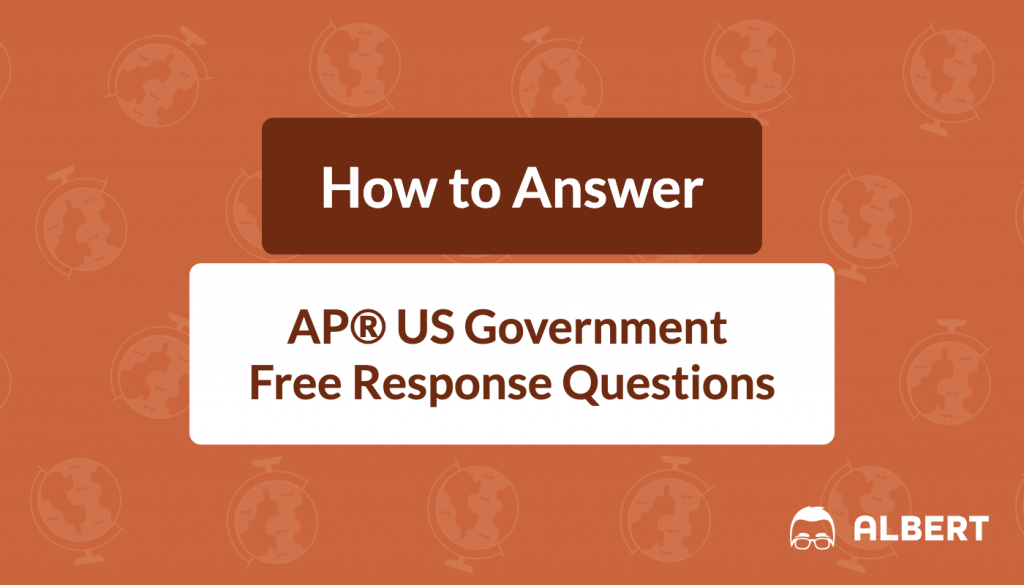
Mastering the free response section can make or break any student’s AP® US Government and Politics score. If you’re looking for the best tips and tricks for answering AP® US GoPo free response questions, you’ve come to the right place.
In this article, we’ll review tips for writing top-mark AP® US Government and Politics FRQs, mistakes that students make one too many times on past AP® GoPo exams, and how to use past AP® free response questions to start practicing for your upcoming exam.
Keep reading to get everything you need to know when it comes to making the most of your AP® US Government and Politics exam review.
What We Review
5 Steps on How to Write Effective AP® US Government and Politics Free Responses
Here, we’ll review a five-step strategy for you to start writing AP® US GoPo free response answers that will score you maximum possible points.
1. Commit to learning what gets you points on the AP® US Government and Politics exam by reviewing past rubrics and scoring guidelines.
A common mistake students make when it comes to preparing for their AP® GoPo exam is failing to understand how they’re being graded. The first step to solving this is going to the College Board’s AP® Central website and navigating to the past released exams for US Government.
Here is the link for AP® US Government and Politics past released exams
Open up the scoring guidelines PDF. These guidelines outline how points were distributed on that particular year’s exams.
Here’s a screenshot from the first question of the 2019 released exam:
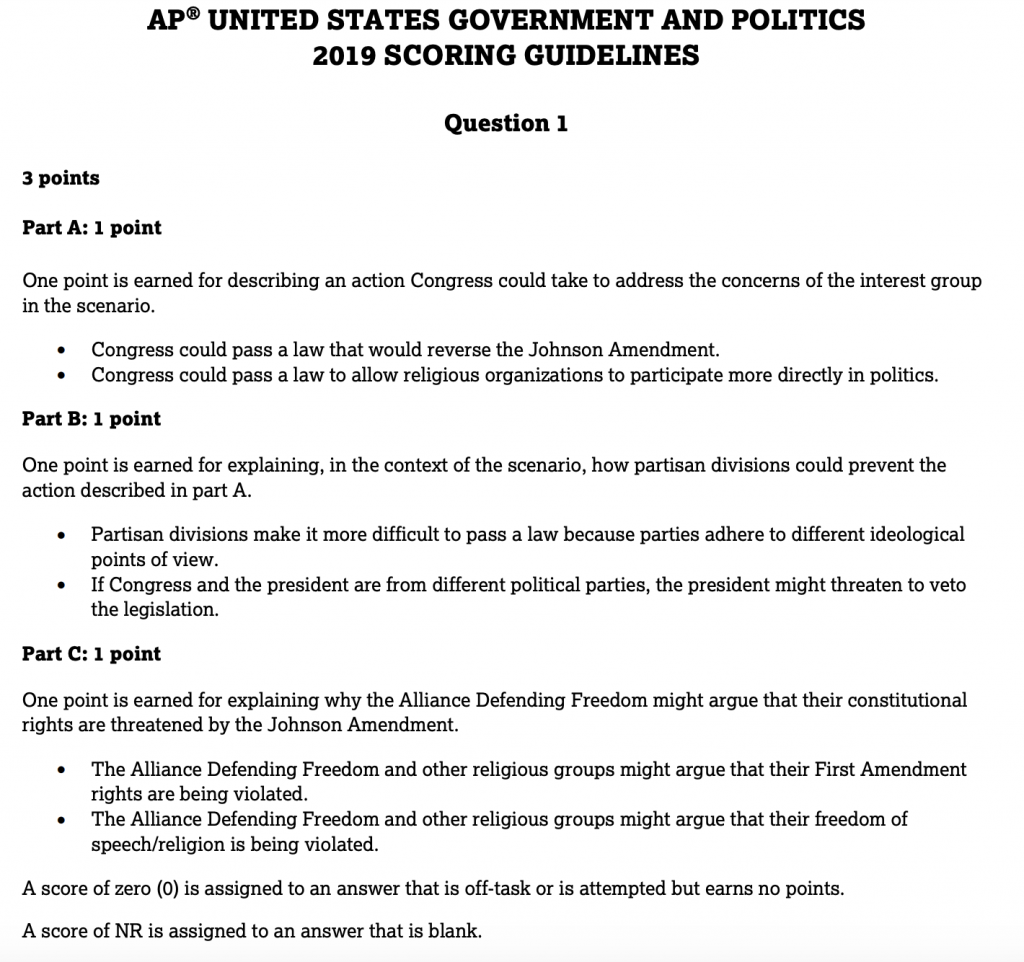
Source: College Board
From this, you can see that this short answer question in 2019 was worth three points, with one point being allocated to each part. There are certain directive words to keep an eye on when reviewing AP® US Government and Politics free response questions, but we’ll get into that later.
For now, just make sure you review at least two years worth of released exam scoring guidelines so you begin to understand how questions and parts of questions are weighted.
2. Underline or circle every bolded and capitalized word in the question prompt.
Alright, so now that we know how points are generally distributed, we need to build the habit of having a system for ensuring we actually answer the question asked by the College Board when we start our AP® US Government and Politics free response section.
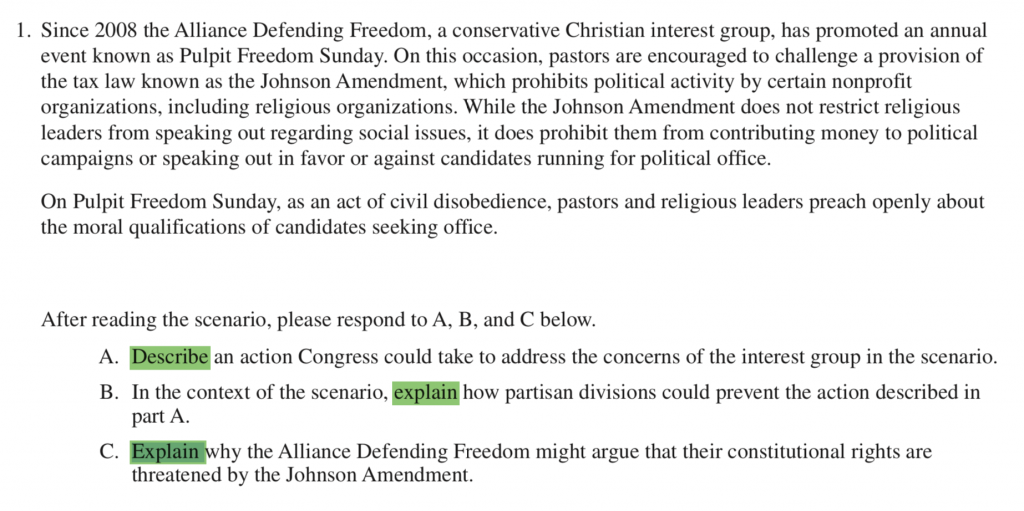
AP® US Government and Politics isn’t as “nice” as AP® Biology free response questions in that they don’t always bold key directive words for you to know what is being asked.
That being said, it’s not hard to circle or underline for yourself the key thing you are being asked to answer.
There are three “key phrases” to commit to memory when it comes to AP® US Government and Politics free response questions:
That’s it. If you look at the last few years worth of released exam questions, these are the most commonly used directive words for the short answer question section of the AP® US Government and Politics free response section.
If you aren’t sure what the three of these words are asking you for, keep reading.
When the exam asks you to describe something, you need to tell them about what they’re asking. This doesn’t mean you need to explain the “why” — it just means you need to talk about what the topic is and the characteristics of the topic being asked.
When you’re asked to explain something, this is where you need to show the “why”. You need to be able to give 3-5 sentences with an example in most cases to earn credit for these questions.
Finally, when asked to identify something, you need to simply indicate that you know what the topic is related to — no need for explanation or elaboration as you might when asked to describe or explain.
One of our best test taking tips we can give you is to make a tick mark or star next to the words you have circled or underlined after you’ve answered it in your free response. This serves as a visual checklist for you to make sure you answered all parts of the question.
Trust us! It’s easy to forget to answer one small part of an FRQ, and that can make all the difference in your free response score.
Aside from the three directive words above, other commonly used ones for AP® GoPo include:
- Define : Similar to identify — show that you know what the topic is but there is no need to elaborate further than what’s asked.
- Compare : Provide a description of the similarities and/or differences of the topics presented.
- Develop an Argument : State a claim and support it with evidence.
- Draw a Conclusion : Make an accurate statement from what has been presented.
3. Plan your response BEFORE beginning to write your response.

One of the most commonly cited mistakes students make on the AP® GoPo free response section is not actually answering the question in a thoughtful way.
The College Board uses the free response section to test your ability to connect the dots with what you’ve learned in class. You need to demonstrate skills such as considering evidence to incorporate and how that fits into your analysis.
This means plan out your response before you begin writing!
Take a second before putting your pen down to start writing to think through how you’ll answer the “why” based questions.
Think deeply about what the question is actually asking you — sometimes students answer questions without actually…answering the question.
Readers often express that student misconceptions come from having a poorly planned response or simply restating the question without adding any direct response to the question they were asked.
4. Remember that AP® US Government and Politics free responses are not like other subjects — treat them differently than you may in AP® English Language.

When it comes to the short answer questions in AP® GoPo, you do not need to write an essay to score max points. There is no need for an introduction, thesis, or conclusion on these questions.
When it comes to the argumentative essay, it’s not necessarily a cookie-cutter five paragraph essay either.
The argumentative essay’s scoring depends on each proceeding section building on the prior. On every question 4, the College Board states exactly what you need to score maximum possible points.
You need:
- To articulate a defensible claim or thesis that responds to the prompt and establishes a line of reasoning.
- Typically one will be from a foundational document while the other will be any other foundational document you learned in class
- Use reasoning to explain why your evidence supports your claim or thesis
- Respond to an opposing or alternative perspective using refutation, concession, or rebuttal.
What this means is that as long as you cover all the points outlined above clearly, you can score a perfect score on the argumentative essay!
When it comes to preparing for the argumentative essay, one of the best things you can do is make sure you are fully comfortable with all 9 foundational documents and 15 Supreme Court cases.
The required foundational documents to know are:
- The Declaration of Independence
- The Articles of Confederation
- The Constitution of the United States
- Federalist No. 10
- Brutus No. 1
- Federalist No. 51
- Federalist No. 70
- Federalist No. 78
- Letters from a Birmingham Jail
Kelsey Falkowski has a nice 15-minute review video of these foundational documents here .
The required Supreme Court cases are:
- Marbury v. Madison (1803)
- McCulloch v. Maryland (1819)
- Schenck v. United States (1919)
- Brown v. Board of Education of Topeka (1954)
- Baker v. Carr (1961)
- Engel v. Vitale (1962)
- Gideon v. Wainwright (1963)
- Tinker v. Des Moines Independent Community School District (1969)
- New York Times Company v. United States (1971)
- Wisconsin v. Yoder (1972)
- Roe v. Wade (1973)
- Shaw v. Reno (1993)
- United States v. Lopez (1995)
- McDonald v. Chicago (2010)
- Citizens United v. Federal Election Commission (2010)
Adam Norris has a great 11-minute review video on these fifteen cases here .
Typically when it comes to the final component, we like using rebuttals more than concessions or refutations. The reason why is because when you make a concession or refutation on a claim you made earlier in your essay, it can potentially come across as a weakening of your thesis if you are not able to position it properly.
The last thing to remember here is to make sure you “close the loop”. This is a test taking strategy the College Board promotes across multiple disciplines and with good reason — it challenges a student to demonstrate they can form a coherent argument. Closing the loop in AP® US Government can mean using words like “because” or “therefore” to help bridge two concepts together and solve for the “why” this matters.
5. Practice, practice, and did we say practice?
When you reduce AP® free response sections down to their core, regardless of subject domain, mastering them comes down to two things: knowing how you’re going to be graded, and learning how to craft responses that fit those rubrics.
Sometimes students do the first part well but fail to practice enough at doing the second part, and vice versa.
When you first start out, we recommend trying a set of past released questions and then having a friend grade your responses with the scoring guidelines. See how you would do without any intentional prep. Then, learn from your mistakes, log your mistakes in a study journal, and begin intentionally tackling other years one by one.
After a few times of doing this, you’ll begin building your intuition to craft a perfect-score response for your AP® US Government and Politics free responses.
25 AP® US Government and Politics FRQ Tips to Scoring a 4 or 5
Now that we’ve gone over the 5-step process to writing good AP® GoPo free responses, we can shift gears to tackle some test taking tips and tricks to maximizing your FRQ scores.
We recommend you review these several weeks, and then days before your exam to keep them top of mind.
- Know which SAQ you’re weakest at. There are always three core question types: concept application, quantitative analysis, and SCOTUS comparison. If you’re weak at one, make sure you’ve reviewed all the past released exams for that particular SAQ.
- Make sure you review how issues or ideology can drive partnership on specific issues.
- Focus on applying the political concepts and processes you learned in class to scenarios in context. This is one of the most common mistakes for the SAQs.
- One of the easiest ways to bridge two concepts is to use words like “because” or “therefore” and then proceed to answer the “why this matters”.
- Focus on what is right instead of what is wrong in your response. These free response questions are often graded based on what’s right more so than what’s wrong (which is different from another subject like AP® Biology).
- If you’re not 100% sure about a supporting statement, add a second supporting statement on the topic as backup.
- If you’re offering specificity, make sure to be explicit on what the intent of you introducing that in your response is. For example, if something is being presented to rebuttal something else, explain why or how it does so.
- When it comes to data analysis, you need to make sure you are comfortable interpreting data and applying data to demonstrate how it interacts with the political process.
- In the past, students have not been able to analyze and apply data to course content — they make mistakes in connecting how policy relates to respective parties in the political process.
- When practicing data analysis, it’s important to look at a variety of different types of graphs and focus on identifying the similarities and differences within a set of complex data.
- Data analysis is not just reading graphs, but also reading charts and tables. Don’t just think because you got one question reading a graph correctly that you’re good to go for your quantitative analysis SAQ.
- One of the easiest ways to bolster your data analysis skills is by reviewing sources such as the Gallup National Polls or Pew Research findings.
- When it comes to SCOTUS comparison, students often fail to effectively compare the two cases — they do a fine job of recalling the required case, but struggle to connect the required case to the non-required case.
- Remember that the SCOTUS comparison SAQ is typically not going to ask you to discuss the rulings of the required case, but rather the facts of the cases and how it applies to the non-required case.
- Keep an eye out for when you’re asked for the clause from an amendment or the Constitution. This means there will only be one right answer.
- Know the difference between reasoning of a case, the decision, opinions of the case, as well as the cold hard facts. Make flashcards or use Quizlet to help here.
- When you’re asked to compare facts, it means you need to review the facts of both cases, not just one. Even if the facts for the non-required case are included in the prompt, you need to include it in your response for points.
- When it comes to the argumentative essay, students typically fail to explain why the evidence they bring up supports their thesis.
- The second area students struggle is in responding to an alternative perspective (refutation, concession, or rebuttal).
- X is your counterargument or counterpoint
- ABC are your strongest supporting points for your argument.
- And Y is your argument.
- Know your foundational documents cold. Sometimes students mix up these documents. There are four different Federalists to know!
- When looking to get the reasoning point, make sure to explain why the evidence you’re procuring supports your thesis. Don’t just restate your thesis or state the evidence without connecting the two.
- When seeking your perspective point (for refutation, concession, or rebuttal), make sure to state the alternative point of view, but also respond to it. Both of these parts are needed.
- Work with a friend through at least three years of AP® GoPo FRQs. Then swap with each other and go through the scoring guidelines together to get consistent exposure to the rubrics.
- By your last two weeks before the exam, you should have clearly identified your 3-5 biggest weaknesses when it comes to FRQs. Devote at least 70% of your time to these areas and the remaining time on general review.
Wrapping Things Up: How to Write AP® US Government and Politics FRQs
Wow! We’ve gone over a ton of things in this AP® US Government and Politics review guide. At this point, you should have everything you need to get started in preparing for your GoPo FRQs.
To summarize, here are a few things to remember:
- Great AP® US Government and Politics free response scores are only made when you know how you’re being graded. Learn the rubrics.
- Have a consistent system for responding to each question. We recommend circling or underlining what you’re being asked, and then adding a tick or star next to the word in the prompt when you’ve answered it.
- Know the facts of your foundational documents and required Supreme Court cases cold. Students have missed points in the past by mixing up one with another.
- Practice working with multiple types of data for the quantitative analysis SAQ: this means reviewing charts, graphs, and tables. Focus on being able to interpret the data presented to political concepts or processes.
- Review commonly tested AP® US Government and Politics topics. Review the curriculum and exam description to see the percentage breakdown of different units. Unit 2 on Interactions Among Branches of Government is a very important one to know as it makes up 25-36% of the exam.
- Make sure your thesis includes a clear line of reasoning. Remember the model: Although X, ABC, therefore Y.
- Always “close the loop”. Use words such as “because” or “therefore” to bridge two concepts together and solve for the “why” this matters.
We hope you’ve found this exhaustive guide helpful for your AP® US Government and Politics exam review.
If you’re looking for more free response questions or multiple choice questions, check out our website! Albert has hundreds of original standards-aligned practice questions for you with detailed explanations to help you learn by doing.
If you found this post helpful, you may also like our AP® US Government tips here or our AP® US GoPo score calculator here .
We also have an AP® US Government review guide here .
Interested in a school license?
2 thoughts on “how to answer ap® us government free response questions”.
On the list of required supreme court cases, you guys listed Schneck v United States with the wrong year.
Great catch, Johnny! We’ve updated the list to include the correct date (1919).
Comments are closed.
Popular Posts

AP® Score Calculators
Simulate how different MCQ and FRQ scores translate into AP® scores

AP® Review Guides
The ultimate review guides for AP® subjects to help you plan and structure your prep.

Core Subject Review Guides
Review the most important topics in Physics and Algebra 1 .

SAT® Score Calculator
See how scores on each section impacts your overall SAT® score

ACT® Score Calculator
See how scores on each section impacts your overall ACT® score


Grammar Review Hub
Comprehensive review of grammar skills

AP® Posters
Download updated posters summarizing the main topics and structure for each AP® exam.
25 Essay Topics for American Government Classes
Writing Ideas That Will Make Students Think
- Teaching Resources
- An Introduction to Teaching
- Tips & Strategies
- Policies & Discipline
- Community Involvement
- School Administration
- Technology in the Classroom
- Teaching Adult Learners
- Issues In Education
- Becoming A Teacher
- Assessments & Tests
- Elementary Education
- Secondary Education
- Special Education
- Homeschooling
- M.Ed., Curriculum and Instruction, University of Florida
- B.A., History, University of Florida
If you are a teacher searching for essay topics to assign to your U.S. government or civics class or looking for ideas, do not fret. It is easy to integrate debates and discussions into the classroom environment. These topic suggestions provide a wealth of ideas for written assignments such as position papers , compare-and-contrast essays , and argumentative essays . Scan the following 25 question topics and ideas to find just the right one. You'll soon be reading interesting papers from your students after they grapple with these challenging and important issues.
- Compare and contrast what is a direct democracy versus representative democracy.
- React to the following statement: Democratic decision-making should be extended to all areas of life including schools, the workplace, and the government.
- Compare and contrast the Virginia and New Jersey plans. Explain how these led to the Great Compromise .
- Pick one thing about the U.S. Constitution including its amendments that you think should be changed. What modifications would you make? Explain your reasons for making this change.
- What did Thomas Jefferson mean when he said, "The tree of liberty must be refreshed from time to time with the blood of patriots and tyrants?" Do you think that this statement still applies to today's world?
- Compare and contrast mandates and conditions of aid regarding the federal government's relationship with states. For example, how has the Federal Emergency Management Agency delivered support to states and commonwealths that have experienced natural disasters?
- Should individual states have more or less power compared to the federal government when implementing laws dealing with topics such as the legalization of marijuana and abortion ?
- Outline a program that would get more people to vote in presidential elections or local elections.
- What are the dangers of gerrymandering when it comes to voting and presidential elections?
- Compare and contrast the major political parties in the United States. What policies are they preparing for upcoming elections?
- Why would voters choose to vote for a third party, even though they know that their candidate has virtually no chance of winning?
- Describe the major sources of money that are donated to political campaigns. Check out the Federal Election Regulatory Commission's website for information.
- Should corporations be treated as individuals regarding being allowed to donate to political campaigns? Look at the 2010 Citizens United v. FEC ruling on the issue. Defend your answer.
- Explain the role of social media in connecting interest groups that have grown stronger as the major political parties have grown weaker.
- Explain why the media has been called the fourth branch of government. Include your opinion on whether this is an accurate portrayal.
- Compare and contrast the campaigns of U.S. Senate and House of Representatives candidates.
- Should term limits be instituted for members of Congress? Explain your answer.
- Should members of Congress vote their conscience or follow the will of the people who elected them into office? Explain your answer.
- Explain how executive orders have been used by presidents throughout the history of the U.S. What is the number of executive orders issued by the current president?
- In your opinion, which of the three branches of the federal government has the most power? Defend your answer.
- Which of the rights guaranteed by the First Amendment do you consider the most important? Explain your answer.
- Should a school be required to get a warrant before searching a student's property? Defend your answer.
- Why did the Equal Rights Amendment fail? What kind of campaign could be run to see it passed?
- Explain how the 14th Amendment has affected civil liberties in the United States from the time of its passage at the end of the Civil War.
- Do you think that the federal government has enough, too much or just the right amount of power? Defend your answer.
- How to Teach the Compare and Contrast Essay
- American Government Journal Topics
- 101 Compare and Contrast Essay Topics
- 61 General Expository Essay Topic to Practice Academic Writing
- High School Debate Topics
- Expository Essay Genre With Suggested Prompts
- Social Studies Curriculum Plan of Study
- Halloween Lesson Plan Ideas
- Social Studies Warmups: Exercises to Get Students Thinking
- Beef Up Critical Thinking and Writing Skills: Comparison Essays
- Public Vs. Private School Teaching
- Teaching Tools for Viewing Cosmos
- Cosmos Episode 10 Viewing Worksheet
- January Writing Prompts
- April Writing Prompts
- Stage a Debate in Class

Choose Your Test
- Search Blogs By Category
- College Admissions
- AP and IB Exams
- GPA and Coursework
The Complete Guide to the AP Comparative Government and Politics Exam
Advanced Placement (AP)

The AP Comparative Government and Politics exam tests your knowledge of how the political systems in different countries are similar and different. The exam requires endurance, strong critical thinking, and top-notch writing skills…which means you’ll need to be extra prepared!
If you’re looking for an AP Comparative Government study guide to carry you through all of your AP prep, look no further than this article! We’ll walk you through:
- The structure and format of the AP Government — Comparative exam
- The core themes and skills the exam tests you on
- The types of questions that show up on the exam and how to answer them (with sample responses from real AP students!)
- How the AP Comparative Government exam is scored, including official scoring rubrics
- Four essential tips for preparing for the AP Comparative Government exam
Are you ready? Let’s dive in!

Exam Overview: How Is the AP Government — Comparative Exam Structured?
First things first: you may see this exam referred to as both the AP Government — Comparative exam or t he AP Comparative Government exam. Don't worry, though...both of these names refer to the same test!
Now that we've cleared that up, let's look at the structure of the test itself. The AP Comparative Government and Politics exam tests your knowledge of basic political concepts and your ability to compare political systems and processes in different countries.
This AP exam is on the shorter side, lasting for a total of two hours and 30 minutes . You’ll be required to answer 55 multiple-choice questions and four free-response questions during the exam.
The AP Comparative Government exam is broken down into two sections . Section I of the exam consists of 55 multiple-choice questions and lasts for one hour. The first section of the exam accounts for 50% of your overall exam score.
Section II of the AP Comparative Government exam consists of four free-response questions . On this part of the exam, you’ll be asked to provide open-ended, written responses to all four free-response questions. Section II lasts for one hour and 30 minutes and counts for 50% of your overall exam score .
To give you a clearer picture of how the AP Comparative Government exam is structured, we’ve broken the core exam elements down in the table below:
Source: The College Board
The AP Comparative Government and Politics exam tests you on a wide range of topics and skills that you need to really drive home before exam day. To help you prepare, we’ll go over the AP Comparative Government course themes, skills, and units next!

What’s on the AP Government — Comparative Exam? Course Themes, Skills, and Units
The AP Government — Comparative course teaches you the skills used by political scientists . To develop these skills during the course, you’ll explore content that falls into five big ideas that guide the course.
The five big ideas for AP Comparative Government are:
- Big Idea 1: Power and Authority
- Big Idea 2: Legitimacy and Stability
- Big Idea 3: Democratization
- Big Idea 4: Internal/External Forces
- Big Idea 5: Methods of Political Analysis
On the AP Comparative Government exam, you’ll show your mastery of the skills associated with these big ideas by answering questions that ask you to apply concepts, analyze data, compare countries, and write political science arguments.
The content and skills you’ll study throughout the AP Comparative Government course are divided out into five units of study . You’ll be tested on content from all five course units during the AP Comparative Government exam. Getting familiar with what each unit covers and how those topics are weighted in your overall exam score will help you get prepared for exam day!
You can view each course unit, the topics they cover, and how they’re weighted in your exam score below:
Now that you know what’s on the AP Comparative Government exam, let’s break down the two sections of the exam even further. We’ll look at Section I and Section II of the AP Comparative Government exam next!
AP Comparative Government Exam: Section I
The first section of the exam tests your ability to describe, explain, compare, and analyze political concepts and processes, various forms of data, and text passages. You’ll be asked to demonstrate these skills by answering both individual and sets of multiple-choice questions.
Section I consists of 55 multiple-choice questions, lasts for one hour, and counts for 50% of your exam score.
Here’s a breakdown of how each skill is assessed on the multiple-choice section of the exam:
- Approximately 40–55% of multiple-choice questions assess students’ ability to apply political concepts and processes in hypothetical and authentic contexts.
- Approximately 25–32% of multiple-choice questions will assess students’ ability to compare the political concepts and processes of China, Iran, Mexico, Nigeria, Russia, and the United Kingdom.
- Approximately 10–16% of multiple-choice questions will assess students’ ability to analyze and interpret quantitative data represented in tables, charts, graphs, maps, and infographics
- Approximately 9–11% of multiple-choice questions will assess students’ ability to read, analyze, and interpret text-based sources.
To help you get a better idea of what the multiple-choice questions are like on this part of the AP Comparative Government exam, let’s look at a sample question and how it’s scored next .
Sample Question: Multiple-Choice
Looking at sample multiple-choice questions can help you grasp the connection between what you learn in the AP Comparative Government course and what you’ll be tested on during the exam.
The individual multiple-choice question below comes from the College Board’s official guide to AP Comparative Government and Politics .
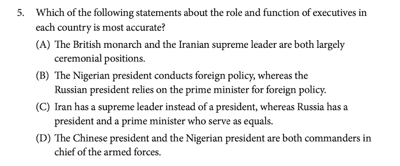
The multiple-choice question above asks you to compare two or more countries based on their political systems and behaviors. It draws on your knowledge of Big Idea #1: Power and Authority because it asks about the role of government executives in different countries . You’ll focus on these concepts during Unit 2 of your AP Comparative Government course, which explores political institutions in different countries.
The correct answer to this multiple-choice question is D : “The Chinese president and the Nigerian president are both commanders in chief of the armed forces.”
AP Comparative Government Exam: Section II
Like Section I, the second section of the exam tests your ability to describe, explain, compare, and analyze political concepts and processes, various forms of data, and text passages. In this section, you’ll be asked to demonstrate these skills by providing written responses .
Section II consists of four free-response questions, lasts for one hour and 30 minutes, and counts for 50% of your exam score.
There are four different types of free-response questions on the exam, and each one tests your reading and writing skills in different ways. Here’s a breakdown of what you’ll be asked to do on each free-response question on the exam:
- 1 conceptual analysis question: You’ll define or describe a political concept and/or compare political systems, principles, institutions, processes, policies, or behaviors.
- 1 quantitative analysis question: You’ll analyze data to find patterns and trends and reach a conclusion.
- 1 comparative analysis question: You’ll compare political concepts, systems, institutions, processes, or policies in two of the course countries.
- 1 argument essay: You’ll write an evidence-based essay supporting a claim or thesis.
To help you get a better sense of what the free-response questions are like on this part of the AP Comparative Government exam, let’s look at an example of each type of question and how it’s scored next .
Sample Question: Conceptual Analysis Free-Response
The free-response question below is taken from the College Board’s official guide to AP Comparative Government and Politics . This sample question is an example of a conceptual analysis question. This is the first type of question that you’ll encounter on the exam.
On the real exam, you’ll have 10 minutes to answer the conceptual analysis question . Check out the question below:
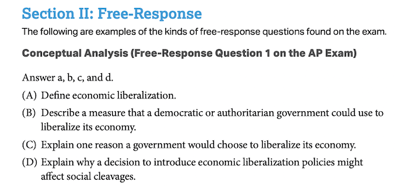
To understand how to answer this question correctly, we’ll need to look at how conceptual analysis questions are scored on the exam. The scoring rubric below shows how your response to this question would be evaluated after the exam:
Sample Question: Quantitative Analysis Free-Response
The Quantitative Analysis free-response question gives you quantitative data in the form of a graph, table, map, or infographic. You’ll be asked to describe, draw a conclusion, or explain that data and its connections to key course concepts.
The quantitative analysis question is the second question you’ll encounter on the exam. It’s worth five raw points of your score on this section of the exam, and you should spend about 20 minutes answering this question.
The quantitative analysis question below comes from the College Board’s official guide to AP Comparative Government and Politics :
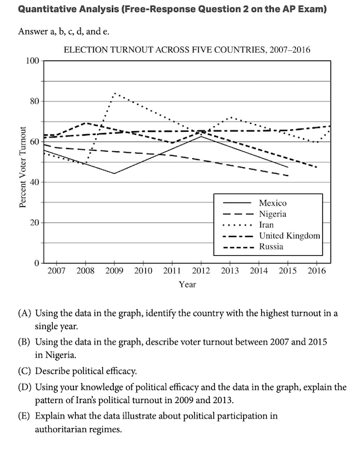
To get a better idea of how to answer this question, let’s look at the scoring rubric that’s used to evaluate this quantitative analysis question on the exam:
Sample Question: Comparative Analysis Free-Response
The Comparative Analysis free-response question assesses your ability to define, describe, compare, or explain political concepts, systems, institutions, or policies in different countries. This question is the third free-response question that you’ll answer on the exam.
The Comparative Analysis question is worth five raw points of your score on this section of the exam, and you should spend about 20 minutes answering this question.
The comparative analysis question below comes from the College Board’s official guide to AP Comparative Government and Politics :
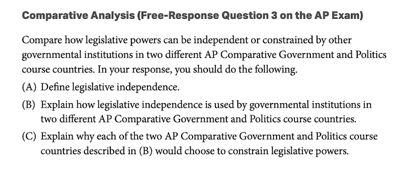
We can take a look at the scoring rubric that’s used to evaluate this type of free-response question to get a better idea of what types of responses will earn you full points:
Sample Question: Argument Essay Free-Response
The fourth and final free-response question you’ll encounter on the exam is the Argument Essay question. This free-response question assesses your ability to make a claim that responds to the question, defend and support your claim with reasonable evidence, and respond to an opposing view on the topic at hand.
The Argument Essay question is worth five raw points, and it’s recommended that you spend about 40 minutes answering this question.
The argument essay question below comes from the College Board’s official guide to AP Comparative Government and Politics :
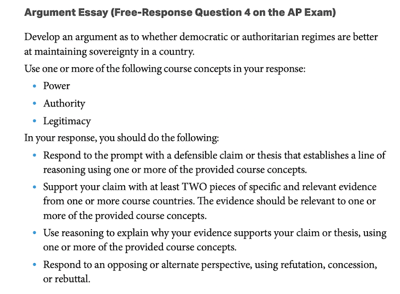
To understand what an effective response to this question looks like, we’ll need to think about how argument essay questions are scored on the exam.
The scoring rubric for this free-response question is quite long; you’ll find four separate categories for evaluation in the rubric below , as well as examples of responses that will earn you full points in each category.
The scoring rubric below shows how your response to this question will be evaluated:
How Is the AP Comparative Government Exam Scored?
Before you take the AP Comparative Government exam, you need to know how your responses will be scored. Here, we’ll explain how each section of the AP Comparative Government exam is scored, scaled, and combined to produce your final score on the AP 1-5 scale .
As a quick reminder, here’s how the score percentages breakdown on the exam:
- Section I: Multiple-choice: 55 questions, 50% of overall score
- Section II: Free-response: four questions, 50% of overall score
- Question 1: Conceptual Analysis: 11%
- Question 2: Quantitative Analysis: 12.5%
- Question 3: Comparative Analysis: 12.5%
- Question 4: Argument Essay: 14%
On the multiple-choice section, you’ll earn one raw point for each question you answer correctly. The maximum number of raw points you can earn on the multiple-choice section is 55 points. You won’t lose any points for incorrect answers!
The free-response questions are scored differently. The Conceptual Analysis question is worth four raw points, and the Quantitative Analysis, Comparative Analysis, and Argument Essay questions are each worth five raw points. Collectively, there are a total of 19 raw points you can earn on the free-response section .
Remember: you’ll only lose points on free-response questions for big errors , like providing an incorrect definition or failing to justify your reasoning. While you should use proper grammar and punctuation, you won’t be docked points for minor errors as long as your responses are clear and easy to understand.
You can earn 74 raw points on the AP Comparative Government exam. Here’s how those points are parsed out by section:
- 55 points for multiple-choice
- 19 points for free-response
After your raw scores have been tallied, the College Board will convert your raw score into a scaled score of 1-5 . When you receive your score report, that 1-5 scaled score is the one you’ll see.
The 5 rate for the AP Comparative Government exam is fairly middle-of-the-road in comparison to other AP exams . Take a look at the table below to see what percentage of test takers earned each possible scaled score on the 2021 AP Comparative Government exam:

4 Top Tips for Prepping for the AP Comparative Government and Politics Exam
If the AP Comparative Government exam is right around the corner for you, you’re probably thinking about how to prepare! We’re here to help you with that. C heck out our four best tips for studying for the AP Comparative Government exam !
Tip 1: Start With a Practice Exam
One of the best ways to set yourself up for successful AP exam prep is to take a practice exam. Taking a practice AP Comparative Government exam before you really start studying can help you design a study routine that best suits your needs.
When you take a practice exam before diving into your study regimen, you get the chance to identify your strengths and weaknesses. Identifying your weaknesses early on in your exam prep will help you tailor your study time to eliminating your weaknesses (which translates to earning more points on the exam!).
We recommend taking a full practice exam in the time frame you’ll be allotted on the real exam. This will help you get a real sense of what the timing will feel like on exam day! After you take the practice exam, sit down and evaluate your results. Make note of the questions you missed, the skills those questions assess, and the course content they reference. You can then design a study routine that targets those tougher areas–and give yourself a better chance of earning full exam points in the process!
Tip 2: Create Your Own Cram Sheet
Everyone needs quality study materials in order to prepare well for AP exams. But did you know that creating your own study materials is a great way to help you remember tough material? Creating your own AP Comparative Government cram sheet is a great way to review course concepts and themes and organize your understanding of the material you’ll be tested over later.
You can look up AP Comparative Government cram sheets online and design yours in a similar way…or you can take some time to consider your needs as a learner and test-taker, then design a cram sheet that’s tailor-made for you.
On your cram sheet, you’ll likely want to include course concepts, issues, and questions that pop up on homework, quizzes, and tests that you take in your AP Comparative Government class. From there, you can supplement your cram sheet with info you learn from practice exams, sample free-response questions, and official scoring rubrics. You can work on memorizing that material, or simply use it to organize your study routine!
Tip 3: Practice Free-Response Questions
Free-response questions on AP exams are notoriously difficult, and the AP Government Comparative free-response questions are no different. Writing-based questions can be intimidating for any test-taker, so it’s important to practice free-response questions before the exam.
The College Board provides an archive of past official free-response questions on their website . You can use these to practice and study! Any free-response questions your teacher gives you in class are fair game as well. When you practice free-response questions, remember to stick to the timing you’ll be given on the real exam, and use official scoring rubrics to evaluate your responses. Doing these things will help you get used to what free-response questions will feel like on the real exam!
Tip 4: Take Another Practice Exam
As you wrap up your exam prep and exam day nears, consider taking another practice exam. You can compare your results on your second practice exam to your results on the practice exam that you took before you started studying. You’ll get to see how much you’ve improved over time!
Taking a final practice exam a few weeks before exam day can also help you revamp your exam prep. You can use your exam results to focus your final study time on any remaining struggle areas you’re encountering. Also, your score on your final practice exam can help you get an idea of what you’re likely to score on the real exam. Having this knowledge going into test day can calm your nerves and give you confidence, which are both essential to success on the AP Comparative Government exam!

What's Next?
If you're taking AP Comparative Government, you're probably thinking about taking more AP classes during high school. Here's a list of the hardest AP classes and tests for you.
Wondering how your AP Comparative Government score stacks up to the competition? Here's a list of the average AP scores for every exam to help you figure out.
If you want to get a 5 on your AP exams, you'll need a study plan. Our five-step AP study plan will help you study smarter and boost your scores.

Trending Now
How to Get Into Harvard and the Ivy League
How to Get a Perfect 4.0 GPA
How to Write an Amazing College Essay
What Exactly Are Colleges Looking For?
ACT vs. SAT: Which Test Should You Take?
When should you take the SAT or ACT?
Get Your Free

Find Your Target SAT Score
Free Complete Official SAT Practice Tests
How to Get a Perfect SAT Score, by an Expert Full Scorer
Score 800 on SAT Math
Score 800 on SAT Reading and Writing
How to Improve Your Low SAT Score
Score 600 on SAT Math
Score 600 on SAT Reading and Writing
Find Your Target ACT Score
Complete Official Free ACT Practice Tests
How to Get a Perfect ACT Score, by a 36 Full Scorer
Get a 36 on ACT English
Get a 36 on ACT Math
Get a 36 on ACT Reading
Get a 36 on ACT Science
How to Improve Your Low ACT Score
Get a 24 on ACT English
Get a 24 on ACT Math
Get a 24 on ACT Reading
Get a 24 on ACT Science
Stay Informed
Get the latest articles and test prep tips!

Ashley Sufflé Robinson has a Ph.D. in 19th Century English Literature. As a content writer for PrepScholar, Ashley is passionate about giving college-bound students the in-depth information they need to get into the school of their dreams.
Ask a Question Below
Have any questions about this article or other topics? Ask below and we'll reply!
All Subjects
2024 AP US Government & Politics Exam Guide
12 min read • july 11, 2024
Your Guide to the 2024 AP US Government & Politics Exam
We know that studying for your AP exams can be stressful, but Fiveable has your back! We created a study plan to help you crush your AP Government and Politics exam. This guide will continue to update with information about the 2024 exams, as well as helpful resources to help you do your best on test day. Unlock Cram Mode for access to our cram events—students who have successfully passed their AP exams will answer your questions and guide your last-minute studying LIVE! And don't miss out on unlimited access to our database of thousands of practice questions.
Format of the 2024 AP US Gov Exam
Going into test day, this is the format to expect:
- 📃 55 multiple-choice questions with 80 minutes to complete them.- - There will be ~30 individual, stand-alone questions.- - All the other questions will be put together into sets. You may be asked to complete a quantitative, qualitative, or visual analysis in these questions.
- ✍ 4 free-response questions with 100 minutes to complete them. You should devote ~20 minutes to each response.- - Question 1 is always a concept application question.- - Question 2 is a quantitative analysis question, where you will analyze data and come to a conclusion.- - Question 3 is a Supreme Court case comparison essay. You will compare a required court case with a nonrequired one, explaining how they are related.- - Lastly, question 4 is an argumentative essay . 👉 Check out the 2023 AP US Government and Politics Free-Response Section posted on the College Board site.
Scoring Rubric for the AP US Government Exam
View an example set of questions and the corresponding scoring guidelines (page 186) from the College Board to get an idea of what they look for in your responses! You can also focus in on the argumentative essay (free response #4) and take a look at that rubric here .
Check out our study plan below to find resources and tools to prepare for your AP US Government exam.
When is the 2024 AP Gov Exam and How do I Take it?
Tests will be taken in person at your school. Here is what we know from College Board so far:
- The exam date will be in-person and on paper at your school on Monday, May 6, 2024 at 8 am, your local time. You have 3 hours to take the exam. We will have more updates from College Board soon, but as of now, this is what we know!
How Should I Prepare for the AP Gov Exam?
- First, you need to take stock of your progress in the course so far so that you can build your study plan according to your needs. Download the AP Government and Politics Cheatsheet PDF —a single sheet that covers everything you need to know—so that you can see a map of the entire course and quickly spot the weak areas that you need to focus on.
- Then, create your study plan by focusing on your learning styles and areas to improve. Which types of questions do you need to practice more? We've put together the study plan found below to help you study between now and May. This will cover all of the units and essay types to prepare you for your exam. Pay special attention to the units that you need the most improvement in.
- Study, practice, and review for test day with other students during our live cram sessions via Cram Mode . Cram live streams will teach, review, and practice important topics from AP courses, college admission tests, and college admission topics. These streams are hosted by experienced students who know what you need to succeed.
- Finally, build your study schedule in advance! We highly suggest making your study schedule ahead of time so that you can easily join interactive study sessions such as live streams, voice chats, and study groups.
Pre-Work: Set Up Your Study Environment
Before you begin studying, take some time to get organized.
🖥 Create a study space.
Make sure you have a designated place at home to study. Somewhere you can keep all of your materials, where you can focus on learning, and where you are comfortable. Spend some time prepping the space with everything you need and you can even let others in the family know that this is your study space.
📚 Organize your study materials.
Get your notebook, textbook, prep books, or whatever other physical materials you have. Also create a space for you to keep track of review. Start a new section in your notebook to take notes or start a Google Doc to keep track of your notes. Get yourself set up!
📅 Plan designated times for studying.
The hardest part about studying from home is sticking to a routine. Decide on one hour every day that you can dedicate to studying. This can be any time of the day, whatever works best for you. Set a timer on your phone for that time and really try to stick to it. The routine will help you stay on track.
🏆 Decide on an accountability plan.
How will you hold yourself accountable to this study plan? You may or may not have a teacher or rules set up to help you stay on track, so you need to set some for yourself. First set your goal. This could be studying for x number of hours or getting through a unit. Then, create a reward for yourself. If you reach your goal, then x. This will help stay focused!
AP US Government & Politics 2024 Study Plan
🏛️unit 1: foundations of american democracy, big takeaways:.
Unit 1 introduces the concept of democracy and its various forms. The documents that first started the United States are analyzed by looking at the challenges and promises associated with each. The division of power within our government: individual rights vs government authority and state vs federal government powers are at the heart of this unit and discussed within each founding document.
Definitely do this:
🎥 Watch these videos:
Intro to American Government, models of Representative Democracy : A full review of the types of democracy, the difference between government and politics as well as the functions of government are discussed.
Foundational Documents Review : A deep dive into the foundational documents you need to know for the exam.
Ratification of the Constitution: Constitutional Convention : A review of the compromises leading to the ratification of the Constitution. 📰 Check out these articles:
- Unit 1 Overview: Foundations of American Democracy
- 1.1 Ideals of Democracy
- 1.2 Types of Democracy
- 1.3 Federalist No. 10 & Brutus 1 Summary
- 1.4 Challenges of the Articles of Confederation
- 1.5 Ratification of the US Constitution
- 1.6 Principles of American Government
- 1.7 Relationship Between States and the Federal Government
- 1.8 Constitutional Interpretations of Federalism
- 1.9 Federalism in Action
- 1.10 Required Founding Documents ✍️ Practice:
- Best Quizlet Deck: AP Gov Unit 1 by bryce_s
If you have more time or want to dig deeper:
- 👻 Check out Too Late to Apologize: An Ode to the [object Object] (YouTube)
- Types of Federalism Part 1 - Dual vs Cooperative
- Marbury v. Madison, McCulloch v. Maryland and US v. Lopez
- The Powers - Expressed, Implied, Concurrent, Denied...
⚖️ Unit 2: Interactions Among Branches of Government
Unit 2 dives into the separation of powers between our three branches of government. It looks at the specific powers of each branch as outlined in the Constitution and how each branch has grown in power through the years. The system of checks and balances and the role each branch plays in holding the other accountable is analyzed.
Legislative and Judicial Branch Review : This stream provides a review of the legislative and judicial branches including their powers and role within the federal government.
- Powers of the Presidency : This stream provides a review of the executive branch including its powers and role within the federal government.
Separation of Powers/Checks and Balances : This video from Crash Course reviews the separation of powers between the three branches of government. It also looks at the ways each branch “checks” the other. 📰 Check out these articles:
Unit 2 Overview: Interactions Among Branches of Government
- 2.1 Congress : The Senate and the House of Representatives
2.2 Structures, Powers, and Functions of Congress
2.3 Congressional Behavior
2.4 Roles and Power of the President
2.5 Checks on the Presidency
2.6 Expansion of Presidential Power
2.7 Presidential Communication
2.8 The Judicial Branch
2.9 Legitimacy of the Judicial Branch
2.10 The Court in Action
2.11 Checks on the Judicial Branch
2.12 The Bureaucracy
2.13 Discretionary and Rule-Making Authority
2.14 Holding the Bureaucracy Accountable
2.15 Policy and the Branches of Government ✍️ Practice:
Best Quizlet Deck: Unit 2 – AP Gov by k8te13
- Bill to Law Process
- Review and Application of Iron Triangles and Issue Networks
- Selection and Nomination of Federal Judges
✊ Unit 3: Civil Liberties and Civil Rights
Unit 3 takes the principles of our government established in Units 1 and 2 to analyze maintaining those principles while balancing liberty and order. The role of the Bill of Rights and the 14th amendment in guaranteeing civil rights and liberties for all citizens is at the heart of this unit.
🎥 Watch these videos:
First and Second Amendments : This stream looks at what the first and second amendments say, how they have been interpreted and some of the major Supreme Court cases around them.
Civil Liberties and Civil Rights : This video from crash course provides a review of the civil liberties and civil rights guaranteed to US citizens. It also looks at the way the Bill of Rights has been interpreted since its inception in relation to liberties and rights.
The 14th Amendment : This stream breaks down the 14th amendment and many of the key terms associated with it: due process, equal protection, incorporation, citizenship, and privileges or immunities clause.
Required Supreme Court Cases from 1st-10th Amendments : This stream reviews Supreme Court cases about the 1st-10th Amendments and how they protect civil liberties today! 📰 Check out these articles:
- Unit 3 Overview: Civil Liberties and Civil Rights
- 3.1 The Bill of Rights
- 3.2 First Amendment: Freedom of Religion
- 3.3 First Amendment: Freedom of Speech
- 3.4 First Amendment: Freedom of the Press
- 3.5 Second Amendment: Rights to Bear Arms
- 3.6 Amendments: Balancing Individual Freedom with Public Order and Safety
- 3.7 Selective Incorporation & the 14th Amendment
- 3.8 Amendments: Due Process and the Rights of the Accused
- 3.9 Amendments: Due Process and the Right to Privacy
- 3.10 Social Movements and Equal Protection
- 3.11 Government Responses to Social Movements
- 3.12 Balancing Minority and Majority Rights
- 3.13 Affirmative Action ✍️ Practice:
Best Quizlet Deck: AP Gov – Civil Liberties and Rights by Sandy_Midgley
- 📜 Check out Bill of Rights and Bill of Rights (YouTube)
- Civil Liberties and Civil Rights (Fiveable stream)
🐘Unit 4: American Political Ideologies and Beliefs
Unit 4 focuses on political ideology - the idea that there are different and consistent patterns of beliefs about political values and the role of government within the context that we live in. This unit will discuss the different American ideologies and how major parties influence them.
Political Socialization and Political Ideology : This stream discusses what influences people's political views and a few different dominant political ideologies.
Political Parties and Their Platforms : This stream dives into the major beliefs and ideologies of the Republican and Democratic party platforms, the history of political parties, their impact on voters and the government, and third parties were also discussed.
Economic Ideology - Keynesian vs Supply Side : In this stream we dived into fiscal economic theory and policy, looking at the liberal take on Keynesian theory and the conservative look at supply-side theory. 📰 Check out these articles:
Unit 4 Overview: American Political Ideologies and Beliefs
4.1 American Attitudes about Government and Politics
4.2 Political Socialization
- 4.4 Influence of Political Events on Ideology
4.5 Measuring Public Opinion
4.6 Evaluating Public Opinion Data
4.7 Ideologies of Political Parties
4.8 Ideology and Policy Making
4.9 Ideology and Economic Policy
4.10 Ideology and Social Policy ✍️ Practice:
Best Quizlet Deck: AP GOV Unit 4 by MARGARET_CYLKOWSKI
- A Review of Public Policy (Social Policy)
- A Review of Public Policy (Economic Policy)
- Social Security, Healthcare, and Education Policy
🗳Unit 5: Political Participation
This unit focuses on how we, citizens, can participate in politics as well as how the media, finance and other factors play a part in our government and policy-making.
Voting and Voter Behavior : Who votes and why do they vote? This stream answers these questions and explains the process of voting in the US in this stream.
Campaign Finance : Campaign finance isn't as scary as you think! This stream looks at the Federal Elections Campaign Act, hard vs soft money, Buckley vs Valeo, Bipartisan Campaign Reform Act, Citizens United vs FEC, 501(c)s, and more!
Media Ownership and Bias : This steam discusses the growing concentration of media companies and how bias in media affects both policy-making and public interest.
- Critical Elections: Realignments and Dealignment : Often, students are confused on the differences between a party realignment and dealignment. This stream covers those around the five critical elections in US history. 📰 Check out these articles:
- Unit 5 Overview: Political Participation
- 5.1 Voting Rights and Models of Voting Behaviour
- 5.2 Voter Turnout
- 5.3 Political Parties
- 5.4 How and Why Political Parties Change
- 5.5 Third-Party Politics
- 5.6 Interest Groups Influencing Policy Making
- 5.7 Groups Influencing Policy Outcomes
- 5.8 Electing a President
- 5.9 Congressional Elections
- 5.10 Modern Campaigns
- 5.11 Campaign Finance
- 5.12 The Media
- 5.13 Changing Media ✍️ Practice:
Best Quizlet Deck: AP Government - Political Participation by Carpenter-Economics
🧐AP US Government - Multiple Choice Questions (MCQ)
📰 Check out these articles:
- AP US Government Multiple Choice Questions
- AP US Government Multiple Choice Help (MCQ)
🏛️AP US Government - Free Response Questions (FRQ)
Breaking Down the Supreme Court Case Comparison Essay : This stream discusses how exactly to write the Supreme Court Case Comparison Essay, FRQ #3, on the AP Gov exam! We talked about the elements of a good response, and wrote one ourselves!
Writing Workshop on the Argumentative Essay : This stream explores the Argumentative Essay, looking at the rubric and then using the remainder of the time to practice our skills. 📰 Check out these articles:
AP US Government Free Response Help - FRQs
FRQ: Conceptual Analysis
FRQ: SCOTUS Application
AP Gov FRQ: Argument Essay Review (2020)
AP Gov FRQ: Quantitative Analysis Review (2020) ✍️ Practice:
AP Gov SAQ Practice Prompt Answers & Feedback
AP GoPo Free Response Questions (FRQ) – Past Prompts
- AP Gov Federalism Practice Prompt Answers & Feedback
As you're studying for the AP exam, make sure that you have a handle on all of the Required Cases. Check out this comprehensive study guide that outlines all the Supreme Court Cases you have to know to do your best in May!
© 2024 Fiveable Inc. All rights reserved.
Ap® and sat® are trademarks registered by the college board, which is not affiliated with, and does not endorse this website..
Home — Essay Samples — Government & Politics — American Government — US Government And Politics
Us Government and Politics
- Categories: American Government Policy
About this sample

Words: 1021 |
Published: Aug 16, 2019
Words: 1021 | Pages: 2 | 6 min read

Cite this Essay
To export a reference to this article please select a referencing style below:
Let us write you an essay from scratch
- 450+ experts on 30 subjects ready to help
- Custom essay delivered in as few as 3 hours
Get high-quality help

Dr. Karlyna PhD
Verified writer
- Expert in: Government & Politics

+ 120 experts online
By clicking “Check Writers’ Offers”, you agree to our terms of service and privacy policy . We’ll occasionally send you promo and account related email
No need to pay just yet!
Related Essays
2 pages / 684 words
4 pages / 2590 words
4 pages / 1614 words
1 pages / 417 words
Remember! This is just a sample.
You can get your custom paper by one of our expert writers.
121 writers online
Still can’t find what you need?
Browse our vast selection of original essay samples, each expertly formatted and styled
Related Essays on American Government
The question of whether the government should play a role in funding higher education continues to spark a vigorous and ongoing debate. The accessibility of quality education and the economic implications of such funding are [...]
American politics is a complex and dynamic system that is shaped by a multitude of factors, including historical context, cultural norms, and institutional structures. The Logic of American Politics, a seminal work by Samuel [...]
The United States of America is a nation founded on a set of principles that reflect the philosophical underpinnings of its government. This essay seeks to explore the natural rights, social contract theory, republicanism, and [...]
The United States Constitution is built upon seven fundamental principles that have shaped the country's political landscape for over two centuries. These principles serve as the bedrock of the American political system, guiding [...]
During the antebellum era, cotton was America’s most profitable commodity; and the south was the world’s biggest supplier. The climate, the industrial revolution, the cotton gin, and slave labor, were factors that contributed to [...]
This film happens in 2008. During that time, the world had a big economy. In 2011, the Wall Street has a big revolution and demonstration. Breaking the serious gap between the rich and the poor in the US society. The film [...]
Related Topics
By clicking “Send”, you agree to our Terms of service and Privacy statement . We will occasionally send you account related emails.
Where do you want us to send this sample?
By clicking “Continue”, you agree to our terms of service and privacy policy.
Be careful. This essay is not unique
This essay was donated by a student and is likely to have been used and submitted before
Download this Sample
Free samples may contain mistakes and not unique parts
Sorry, we could not paraphrase this essay. Our professional writers can rewrite it and get you a unique paper.
Please check your inbox.
We can write you a custom essay that will follow your exact instructions and meet the deadlines. Let's fix your grades together!
Get Your Personalized Essay in 3 Hours or Less!
We use cookies to personalyze your web-site experience. By continuing we’ll assume you board with our cookie policy .
- Instructions Followed To The Letter
- Deadlines Met At Every Stage
- Unique And Plagiarism Free

IMAGES
VIDEO
COMMENTS
The Argument Essay differs substantially from the other free-response questions on the AP U.S. Government and Politics exam, but you can and should still follow the Kaplan Method (AP-AP). It is recommended that you take 40 minutes to plan and write your Argument Essay (as opposed to 20 minutes each for the other free-response questions), so ...
The AP U.S. Government and Politics Exam has consistent question types, weighting, and scoring guidelines every year, so you and your students know what to expect on exam day. Section I: Multiple Choice. ... Argument Essay: Develop an argument in the form of an essay, ...
The response earned 1 point for the alternative perspective by describing the alternative perspective with a reason why it would be argued and providing a rebuttal that supports the original thesis. AP. United States Government and Politics 2022 Scoring Commentary. Question 4 (continued) Sample: 4B.
More from Heimler's History:AP HEIMLER REVIEW GUIDE (formerly known as the Ultimate Review Packet): +AP Gov Heimler Review Guide: https://bit.ly/3rfXr2YCheck...
Note: Some questions and scoring guidelines from the 2023 and earlier AP U.S. Government and Politics Exams may not perfectly align with the course and exam updates that take effect in the 2023-24 school year. These questions remain available because teachers say that imperfectly aligned questions still provide instructional value.
Description. This is intended as an end-of-course review activity for practice with the argumentative essay format included on the AP United States Government and Politics exam since the 2018 ...
AP U.S. Government and Politics Exam Tips. The following strategies for answering the free-response questions will help you on exam day. Answering essay questions generally requires a good deal of training and practice. Students too often begin to write immediately, which can create a string of disconnected, poorly planned thoughts.
In this AP Daily: Live Review session, we will cover the Argument Essay and content from Units 1 and 4. We'll develop an argument in essay format related to ...
AP GOVERNMENT ARGUMENT ESSAY RUBRIC Name: _____ Topic: _____ THESIS / CLAIM Articulates a defensible claim or thesis that responds to the prompt ... This rubric is based on guidelines found in the 2019 AP US Government and Politics Course and Exam Description. For more materials, visit tomrichey.net. Title: AP Goverment Argument Essay Rubric (2019)
The expanded powers of the national government benefit policymaking because they can create uniform policies that apply to all the states. - Articles of Confederation: weak national, all states had to agree, almost impossible to amend. - Federalist 10: Factions threaten small republics, strong national prevents singular faction domination.
Sample Prompts for the Argument Essay FRQ- AP government. Below are 16 topics, each of which includes: A sample essential question which introduces the prompt. A draft prompt including three founding documents that could help shape the students' arguments. Each prompt is crafted to encourage deep analysis and aligns with key AP Government ...
The response earned 1 point for using reasoning to explain the relationship between the evidence provided and the claim or thesis by stating that "increased government currupton" has resulted in "the people have less faith in the government's ability to serve them. This has resulted in protest movements.".
Argument Essay (6 raw points) The free-response questions will ask you to integrate your knowledge of the various content areas covered by the course. This includes analyzing political events in the US, discussing examples, and demonstrating your understanding of general principles of US government and politics.
Format of the AP U.S. Government FRQ section. Section II consists of four FRQs you need to answer in 100 minutes (1 hour and 40 minutes) and is worth 50% of your overall exam score (1 FRQ is worth 12.5%). Each FRQ in this section tests you on specific practices and skills you're expected to master by the end of AP U.S. Gov.
Need to write an argumentative essay? Preparing for an upcoming debate? ProCon.org has over 100 topics complete with pro and con arguments, quotes and statistics from experts, historical information, and other pertinent research. Abortion - Should abortion be legal? Alternative Energy - Can alternative energy effectively replace fossil fuels?
5 Steps on How to Write Effective AP® US Government and Politics Free Responses. 1. Commit to learning what gets you points on the AP® US Government and Politics exam by reviewing past rubrics and scoring guidelines. 2. Underline or circle every bolded and capitalized word in the question prompt. 3.
25 Topics. Compare and contrast what is a direct democracy versus representative democracy. React to the following statement: Democratic decision-making should be extended to all areas of life including schools, the workplace, and the government. Compare and contrast the Virginia and New Jersey plans. Explain how these led to the Great Compromise.
Scoring Rubric for 2020 Question 1: Argument Essay 7 points Reporting Category. Scoring Criteria Row A; Claim/Thesis (0-1 points) 5.A: 0 points: 1 point: ... AP United States Government and Politics Free-Response Question 4 Scoring Rubric, Effective Fall 2019 Author: College Board Subject:
1 argument essay: You'll write an evidence-based essay supporting a claim or thesis. To help you get a better sense of what the free-response questions are like on this part of the AP Comparative Government exam, let's look at an example of each type of question and how it's scored next. Sample Question: Conceptual Analysis Free-Response
- Question 3 is a Supreme Court case comparison essay. You will compare a required court case with a nonrequired one, explaining how they are related.- - Lastly, question 4 is an argumentative essay. 👉 Check out the 2023 AP US Government and Politics Free-Response Section posted on the College Board site.
2021 AP Exam Administration Sample Student Responses - AP U.S. Government and Politics Free-Response Question 4: Set 1 Author: College Board Subject: 2021 AP Exam Administration: Student Samples and Commentary Keywords
Us Government and Politics. "We are Americans first, Americans last, Americans always. Let us argue our differences. But remember we are not enemies." (Estepa) This quote from John McCain during his 2004 Republican National Convention speech resonates with Americans, most of whom are victims of the United States' political polarization ...
Government and Politics . Sample Student Responses ... Students were expected to w rite an argumentative essay, demonstrating each of the skills mentioned above. Sample: 4A . Claim/Thesis Score: 1 . Evidence Score: 2 . Reasoning Score: 1 . Alternative Perspectives Score: 1 . The response earned 1 point for responding to the prompt with a ...